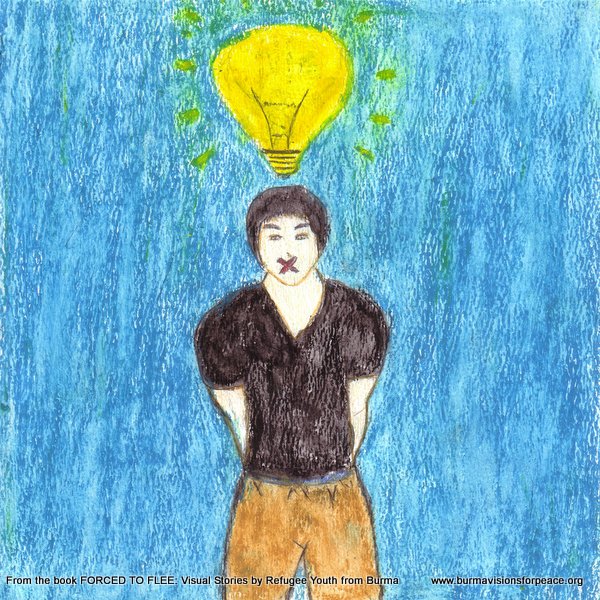World Press Freedom Day or World Press Restrictions Day?
By Burma Partnership • May 4, 2015Sunday 3 May, 2015 was World Press Freedom Day and the Burma Army embraced the sentiment of this day by issuing a gaging order on the media, aimed at stopping them from reporting on statements by the ethnic armed group, the Myanmar National Democratic Alliance Army (MNDAA) with which the Burma Army is at war with. Meanwhile, 12 journalists remain in prison, demonstrating why the Committee to Protect Journalists (CPJ) designated Burma as the 9th most censored country in the world.
Five of the most high profile incarcerated media workers, four journalists and the chief executive officer of the Unity Journal, have been in prison since reporting on a secret chemical weapons factory of the Burma Army in January 2014. They are serving seven years with hard labor after being charged under the colonial-era State Secrets Act. International human rights group, Amnesty International, brought attention to this issue on World Press Freedom Day, encouraging supporters to post ‘#FreeUnityFive’ on the Burma Government’s Information Minister’s Facebook wall. It is not just the Unity five that are in prison. Seven more media workers spent World Press Freedom Day without their freedom, including five from the Bi-Midday Sun newspaper and two from the Myanmar Post Weekly.
Despite initial optimism over media reforms and loosening of restrictions on freedom of expression, the past two years have certainly seen backsliding in this area. In matters related to the Burma Army, as seen in the Unity case, restrictions are at their strictest. It is not only the recent gaging order on reporting MNDAA statements where the military have arbitrarily imposed their will. After the Burma Army was implicated in the rape and murder of two ethnic Kachin teachers in northern Shan State in January 2015, they issued a public threat to take legal action against anyone, including the media, who made any links between the murders and the Burma Army.
Sometimes, however, it is not just threats that the Burma Army issues. The case of freelance journalist, Ko Par Gyi, is a tragic reminder of the levels of violence the Burma Army are prepared to use to censor information. Last year, Ko Par Gyi was covering the conflict between the Democratic Karen Benevolent Army (DKBA) and the proxy forces of the Burma Army, the Border Guard Forces (BGF), when he was taken into military custody, tortured, and killed after being shot five times. As with most human rights violations that they commit, there has been no accountability. A flawed investigation by the Myanmar National Human Rights Commission only served as a cover for this murder.
The sensitivity of the Burma Army to criticism of its military offensives, human rights abuses, and its secretive operations such as the chemical weapons factory coupled with their ability to crackdown on any reporting of such issues is evidence that they have a disproportionate, unfair, and unethical sway over the media landscape. The irony of their gaging order, issued on World Press Freedom Day, is not lost on reporters in Burma. As one journalist told Amnesty International, “The government still has limits. Compared to the previous regime we can get away with many more things, but if you go beyond their limits there will be action. It’s hard always to know, but if you expose anything critical of the military or military affairs you can be jailed, intimidated. They can use the law against you.”
It is these limits that must be lifted, including the freedom to report on military matters, corruption, and human rights abuses. We also join Amnesty international on their call to the Burma Government to free all imprisoned journalists, including the Unity five. Freedom of expression is fundamental to a functioning democracy. If a state or government agency steals your land, murders a member of your community, or is stealing public funds, it is in the interests of the people of a democratic country to know this, and to change the situation at the ballot box. Journalism is not a crime, and in the lead up to the pivotal elections at the end of 2015, freedom of expression is needed more than ever.
(Photo from the book FORCED TO FLEE: Visual Stories by Refugee Youth from Burma. Read life stories and dreams of hundreds of refugee youth from Burma here)
Tags: Amnesty International, Border Guard Force, Committee to Protect Journalists, Democratic Karen Benevolent Army, Freedom of Expression, Information Minister Ye Htut, Kachin, Myanmar National Democratic Alliance Army, Northern Shan State, Political Prisoners, Unity Journal, World Press Freedom Day, Ye HtutThis post is in: Blog
Related PostsMyanmar: Why a UNGA resolution is still needed
Myanmar: Investigate death and alleged rape of Rohingya woman
Myanmar: Sulphuric Acid Factory behind Health Fears Must be Relocated
Oral statement by Amnesty International, the Women Peace Network-Arakan and The Arakan Project in light of the review of Myanmar’s fourth and fifth combined report to the Committee on the Elimination of Discrimination against Women
Open Letter on Amending the Peaceful Assembly and Peaceful Procession Act in Line with International Human Rights Law and Standards










 All posts
All posts